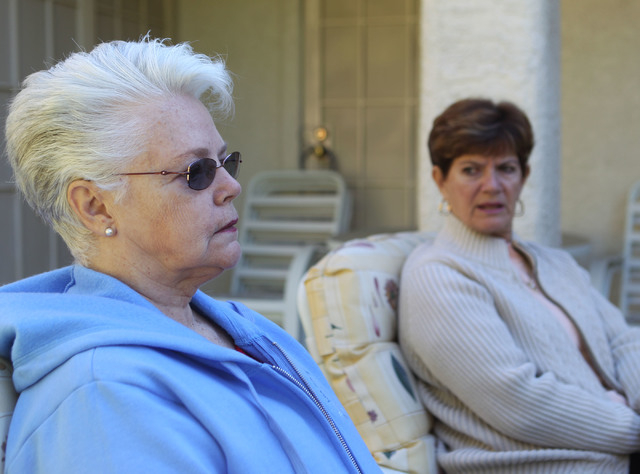Las Vegas vets skeptical about VA bill

Las Vegas Valley veterans who have had uphill battles while seeking health care from the Department of Veterans Affairs expressed skepticism mixed with glimmers of hope for the $16.3 billion VA Reform Act that Congress passed this week.
For the most part, they wondered how a provision will be carried out to provide $10 billion for veterans to see doctors outside the VA system who have waited a month or more for VA health care appointments.
Some also fear the reform measure will be a waste of money. They see it as a congressional Band-Aid to cover deeper, systemic problems in the massive 300,000-employee bureaucracy that’s been rocked by scandal.
Michael Coughlin, a Marine veteran who helps homeless vets learn how to survive outside in urban landscapes, said the VA reform legislation is a step in the right direction “as long as the bureaucracy can keep their grippers out of it. That’s our biggest fear.”
His concern for bureaucratic abuse was echoed by Dee Redwine, whose husband, Jerry, is a 100 percent disabled Army veteran from the Vietnam War. She is skeptical about the VA providing health care altogether.
“I think they should do away with the VA administration, outsource health care for veterans, and let everybody go in the VA,” Dee Redwine said. “There’s been so much failure on the part of the VA administrative system to take care of our veterans in numerous ways.”
She said her husband’s care for post-traumatic stress disorder has been inconsistent, varying from state to state. “His best treatment for a time was in Oklahoma City, and the worst definitely was Las Vegas. It’s just the waiting time. Putting the veterans off, that’s the hardest part.”
Redwine became publicly involved in the VA controversy when she escorted her neighbor, blind Navy veteran Sandi Niccum who was a longstanding VA volunteer, to the VA Medical Center emergency room on Oct. 22 for a lengthy and painful wait for treatment of a colon disorder. Niccum later died.
The VA bill, which President Barack Obama is expected to sign, devotes $10 billion in emergency spending over three years to pay private doctors and other health professionals to care for qualifying veterans who can’t get timely appointments at VA hospitals or clinics, or who live more than 40 miles from one of them.
After the bill passed the Senate late Thursday by a vote of 91 to 3, Majority Leader Harry Reid, D-Nev., said, “More still needs to be done to keep our veterans from falling through the cracks.”
He said he will continue to focus on the VA’s problems to ensure that veterans “receive the care they deserve.”
Republican Sens. Tom Coburn of Oklahoma, Bob Corker of Tennessee and Jeff Sessions of Alabama voted against the bill. They said they fear the legislation will swell future budget deficits.
The bill includes $5 billion for hiring more VA doctors, nurses and other medical staff and $1.3 billion to open 27 new VA clinics across the country. In addition, the legislation makes it easier to fire hospital administrators and senior VA executives for negligence or poor performance.
The legislation is a response to reports of veterans dying while awaiting appointments to see VA doctors and cover-ups of the delays at several of the VA’s 1,000 hospitals and outpatient clinics.
Bruce Brent, who served in the Navy during the Vietnam War, has sometimes scheduled VA health care appointments three months in advance only to receive form letters on short notice informing him that he has to be rescheduled. He has also shown up for an appointment at a local VA clinic only to learn that it wasn’t logged in the system.
He said the $10 billion for outside health care has potential to help veterans like him. Or, it could be “a waste of of money unless there’s a plan.”
“Who authorizes this? If I do go to an outside doctor and have to get treatment and come back for treatment, am I anchored to that doctor or do I come back to the primary care at the VA?” Brent asked. “Congress is just a Band-Aid. It really isn’t getting down to the level of common sense.”
The system would have more accountability, he said, if open meetings were held at clinics where veterans could express their concerns in public and be represented by one of their own “so it’s not a cover-up and have those complaints go to Washington.”
Richard Beam, a spokesman for the VA Southern Nevada Healthcare System, said VA officials don’t know yet how the pending measure will become operational on the local level.
“As of yesterday’s release of the twice monthly updates, we show 6,129 appointments scheduled over 30 days from desired date of either the Veteran of the physician. This accounts for 11.04% of all appointments scheduled,” Beam wrote in an email Friday.
World War II Army veteran Milton Duran has complained about long waits and bad attitudes among employees at the VA Northwest Clinic. He is pessimistic about the reform act’s prospects.
“Any amount of money is not going to help, not the way they’re running it now,” said Duran, a decorated combat rifleman who saw 40 percent of his company get mowed down by Nazi machine gunners near Germany’s Saar River in early 1945.
“They’re abusing veterans, lying to veterans and lying to officials,” he said about VA staffers.
The Associated Press contributed to this report. Contact Keith Rogers at krogers@reviewjournal.com or 702-383-0308. Find him on Twitter: @KeithRogers2.